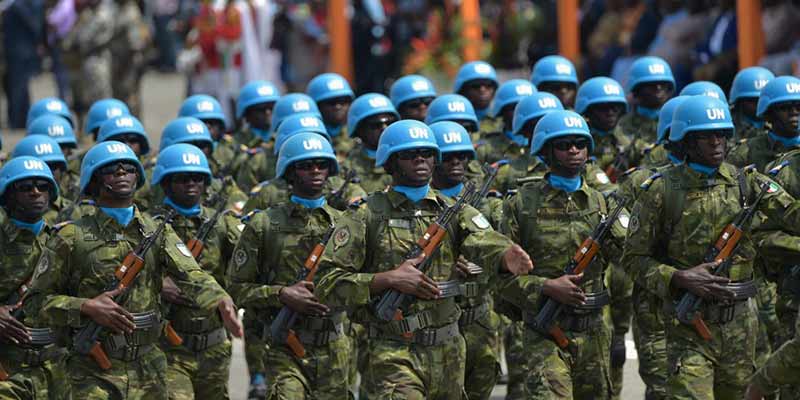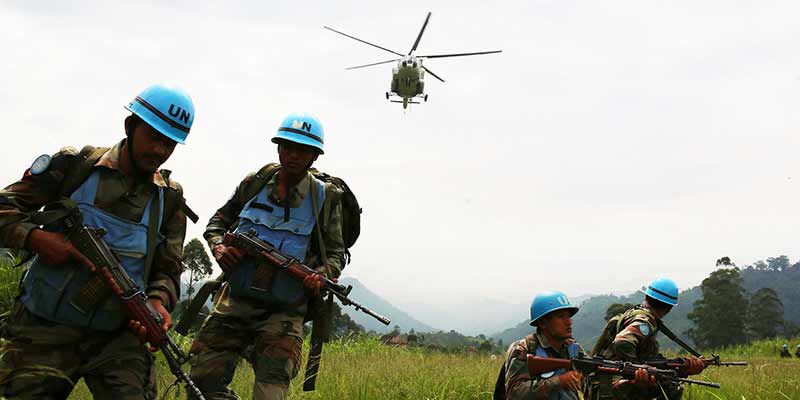- World
- May 29
Explainer - 75 years of UN Peacekeeping
• For 75 years, United Nations peacekeepers have worked to save and change lives in the world’s most fragile political and security situations. Since 1948, more than two million uniformed and civilian personnel have helped countries to transition from war to peace.
• The International Day of UN Peacekeepers is observed on May 29. On this day in 1948, the first UN peacekeeping mission named the ‘United Nations Truce Supervision Organisation’, or UNTSO, began operations in Palestine.
• International Day of UN Peacekeepers was established to honour the memory of the UN peacekeepers who have lost their lives in the cause of peace, and to pay tribute to all the men and women who have served and continue to serve in UN peacekeeping operations for their high level of professionalism, dedication and courage.
• The theme of the 75th anniversary, “Peace begins with me”, recognises the service and sacrifice of peacekeepers, past and present, including more than 4,200 who have given their lives under the UN flag.
• Working alongside local communities, peacekeepers help advance political solutions, prevent conflict, protect civilians, strengthen human rights and the rule of law, and build sustainable peace.
• The challenges faced by peacekeepers are greater than ever, with rising global tensions, more complex conflict, and a proliferation of misinformation and disinformation, which impedes their work and threatens their safety. Despite these obstacles, peacekeepers persevere, alongside many partners, in the collective pursuit of peace.
What is UN peacekeeping?
• UN peacekeeping helps countries torn by conflict create conditions for lasting peace. Peacekeeping has proven to be one of the most effective tools available to the UN to assist host countries navigate the difficult path from conflict to peace.
• It is a unique global partnership. It brings together the General Assembly, the Security Council, the Secretariat, troop and police contributors and the host governments in a combined effort to maintain international peace and security.
• The first UN peacekeeping mission was established in May 1948, when the UN Security Council authorised the deployment of a small number of UN military observers to the Middle East to form the United Nations Truce Supervision Organisation (UNTSO) to monitor the Armistice Agreement between Israel and its Arab neighbours.
• In over 70 years, more than one million men and women have served under the UN flag in more than 70 UN peacekeeping operations. More than one lakh military, police and civilian personnel from 125 countries currently serve in 13 peacekeeping operations.
• In the early years, UN Peacekeeping’s goals were primarily limited to maintaining ceasefires and stabilizing situations on the ground so that efforts could be made at the political level to resolve the conflict by peaceful means. Those missions consisted of military observers and lightly armed troops with monitoring, reporting and confidence-building roles in support of ceasefires and limited peace agreements. Troops and police came from a relatively small number of countries and they were mostly men.
• Over the years, UN Peacekeeping has adapted to meet the demands of different conflicts and a changing political landscape. Today’s multidimensional peacekeeping operations are called upon not only to maintain peace and security but also to facilitate the political processes, protect civilians, disarm combatants, support elections, protect and promote human rights and restore the rule of law.
• Peacekeeping has unique strengths, including legitimacy, burden sharing, and an ability to deploy and sustain troops and police from around the globe, integrating them with civilian peacekeepers to advance multi-dimensional mandates.
The role of UN Security Council
• The Security Council has primary responsibility, under the United Nations Charter, for the maintenance of international peace and security. It is for the Security Council to determine when and where a UN peace operation should be deployed.
• The Security Council responds to crises around the world on a case-by-case basis and it has a range of options at its disposal. It takes many different factors into account when considering the establishment of new peace operation.
• The Security Council establishes a peace operation by adopting a Security Council resolution. The resolution sets out that mission’s mandate and size.
• The Security Council can vote to extend, amend or end mission mandates as it deems appropriate.
The role of General Assembly in financing operations
• While not normally directly involved in political decisions on establishing or terminating UN peace operations, the General Assembly does play a key role in peace operation financing.
• As all UN Member States share the costs of peacekeeping, the Assembly apportions these expenses based on a special scale of assessments, taking into account the relative economic wealth of Member States, with the permanent members of the Security Council required to pay a larger share because of their special responsibility for the maintenance of international peace and security.
• The General Assembly, through its Fifth Committee (Administrative and Budgetary) approves and oversees the peacekeeping budget. This includes how specific field operations are funded and equipped, based on detailed submissions provided to it by the UN Secretary-General.
What are the duties of peacekeepers?
• UN peacekeepers (often referred to as Blue Berets or Blue Helmets) provide security and the political and peacebuilding support to help countries make the difficult, early transition from conflict to peace.
• While most peacekeepers are serving in the military or police, 14 per cent are civilians who perform a wide range of functions, from serving as the civilian leadership of the mission to working in the areas of political and civil affairs, human rights, elections, strategic communications, IT, logistics, transport and administration and more.
• Women peacekeepers today play an increasingly prominent role and are crucial towards improving the performance of the missions. They serve as police officers, troops, pilots, military observers, and other uniformed and civilian posts, including in command positions.
• With its expanded role and operations in some of the world’s most challenging environments, peacekeepers face considerable risks.
India’s role in UN peacekeeping
• Commencing with its participation in the UN operation in Korea in 1950, India has a long and distinguished history of service in UN peacekeeping, having contributed more personnel than any other country, as well as the first-ever all-female force that helped to bring peace to Liberia in the wake of that country’s brutal civil war.
• From 2007-2016, there were nine rotations of all-female police units from India, whose primary responsibilities were to provide 24-hour guard duty, public order management and conduct night patrols in and around the capital of Liberia, Monrovia, while assisting to build the capacity of local security institutions. Hailed as role models, these female officers not only played a vital role in restoring security in the West African nation but also contributed to an increase in the number of women in the country’s security sector.
• More than 2 lakh Indians have served in peacekeeping missions established around the world.
• Medical care is among the many services Indian peacekeepers provide to the communities in which they serve on behalf of the UN. They also perform specialised tasks such as veterinary support and engineering services.
• India has also provided 15 Force Commanders to various missions, and was the first country to contribute to the Trust Fund on sexual exploitation and abuse, which was set up in 2016.
• Over 160 Indian peacekeepers have lost their lives while serving with the UN.
Manorama Yearbook app is now available on Google Play Store and iOS App Store




